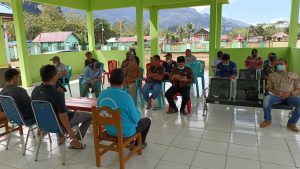Landscape-based livelihood transformation in addressing climate change impacts in Aunupe Village, South Konawe District, Southeast Sulawesi, Indonesia
Alfian, Alfian1*, Mutmainnah, Mutmainnah1; Djafar, Fitria Nur Indah1; Tumora, Imran1; and Rauf, M. Aris1
1Komunitas Teras, Jl. Konasara No. 4, Kelurahan Bonggoeya, Kendari
*alfianlawi@komunitasteras.org

ABSTRACT
Illegal logging and unsustainable land management practices are the biggest challenges to achieve a sustainable development consisting of three pillars such as social, economy, and environment. Economic demands and knowledge of land management are still the classic reasons that led people to behave instantaneously and destructively. To overcome this problem, livelihood transformation practices are needed through various approaches as have been done in Aunupe Village. This village is located in the upper stream of the Wanggu Watershed which is a buffer forest area for life in Kendari City in the downstream area. This study aims to explore the landscape-based approaches of livelihood transformation in Aunupe Village, South Konawe District, Southeast Sulawesi as an effort to adapt to climate change. Through a qualitative method using semi-structured interviews, this study found a multiple factors contributed to the transformation including people’s awareness of the importance of ecosystem sustainability resulted from some hydrometeorological disasters occurred in the downstream area, the increased of knowledge and capacity of the community to carry out more eco-friendly agricultural practices, and intervention of both government and non-governmental organization in providing landscape-based land management models and land use scheme for community in forest area. To conclude, some types of livelihood that were transformed into the more landscape-based and eco-friendly ways including illegal logging to organic farming and agroforestry practices, and ordinary farming to non-pesticides agricultural practices.
Keywords: livelihood transformation, climate change, landscape-based management, spatial planning.